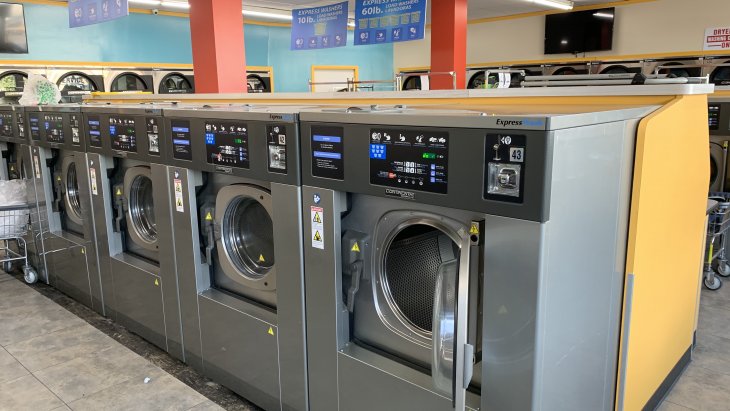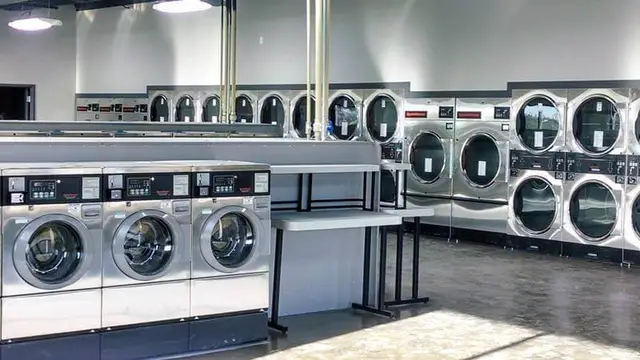Information presented on this web page is intended for informational and educational purposes only and is not meant to be taken as legal, financial, investment or tax advice. We do not accept any responsibility for any trading or investment related losses. Please review our disclaimer on before taking action based upon anything you read or see.
Is a laundromat a good investment? This is a popular question among today’s entrepreneurs and investors. As a result, we’ve written this article to assist you. Being the owner of a small company has its allure. While the attractiveness of being your employer and the freedom that comes with it is well-known, the position also requires a firm knowledge of accountability and pragmatism.
After all, starting a company might fulfill a lifetime ambition. On the other hand, that company is an investment, and you must be prepared to treat it as such. Is it wise to invest in a laundromat?
What is the Earning Potential of a Laundromat?

An entrepreneur must examine the profitability and risk of a new company before embarking on it. So, how lucrative is it to run a laundromat? Laundromats appeal to many businesses since they seem to operate on their own.
Although the owner is responsible for purchasing and maintaining the facilities and equipment, consumers often do the work, and the machinery handles the cash transactions. However, that does not imply that you can sit back and expect to earn a lot from laundry.
Profitability is determined by many factors and varies significantly from one laundromat to the next; furthermore, like with any small company, what you put into it greatly influences what you receive out of it.
So you may be asking what factors and characteristics determine the answer to the question, “How lucrative is a laundromat?” Consider the following things when purchasing your store:
Opportunity
Who are you going to face? If there are currently numerous laundromats in the region, it would be hazardous to create another unless the existing laundromats are in poor condition or have a negative reputation.
It is, nevertheless, perfectly conceivable for two laundries in the same area to be successful, mainly if they provide specific services. Examine your competitors to determine if you may get a competitive advantage.
For example, your laundromat could be cleaner and safer, or it might provide a wash-and-fold service or a TV and vending machines.
Destination
Your Laundromat’s placement may make or break it. Of course, as previously said, being too close to other laundromats may have an impact on your ability to attract consumers. Furthermore, being near the main road, having prominent signs, and providing enough parking can help you attract notice.
Take into account the area’s demographics as well. An affluent family’s neighborhood is less likely to need a laundromat than a community with numerous apartments and young people.
Out of pocket costs
Your costs will strongly influence your earnings. How much will you pay for power and water, for example? You may incur a higher initial fee but cheaper expenses in the long run if you utilize energy-efficient devices.
Will you need to engage part-time employees to clean the shop and do other basic tasks? Will you need the services of a security company? You may also need to hire a bookkeeper, economist, and marketing expert.
Services
Will you stick to the fundamentals and only provide room for consumers to do their laundry using coin-operated machines, or will you expand? For example, give a wash-and-fold (also known as fluff-and-fold or drop-off) service? Will you be able to do pick-ups and deliveries?
Daily management
You’ll have a problem attracting new clients and getting recurring ones if your laundromat isn’t adequately maintained. You will have to clean and maintain the laundromat yourself unless you employ workers.
The plan is ongoing to the store every day and does essential housekeeping work, contacting suppliers for repairs, collecting revenues, and dealing with client concerns.
Marketing
Customers won’t know you exist or provide excellent service; thus, you won’t be lucrative. To draw attention and interact with your consumers, consider running adverts, purchasing beautiful signs, and developing an internet presence.
Is a Laundromat a Good Investment?

Yes. Because of the following factors, a laundromat is a wise investment:
Not dependent on the season
Laundry is a year-round necessity; hence a laundromat has no off-season. While bad weather may cause individuals to stay inside, there’s no need to prepare for significant seasonal changes in use.
Extremely resistant to recession
While individuals may buy less clothing and gadgets in a lousy economy, the impulse to tidy their closets endures regardless of the dollar’s value. In fact, during difficult times, laundromats typically notice an increase in revenue because individuals are hesitant to buy new dryers for their houses.
Quick payment processing
While many companies must wait 60 to 90 days for payment, washers and dryers take cash, credit card, and app payments. As a result, laundromats have a lightning-fast payment cycle.
What difference does it make? According to studies, cash flow issues were acknowledged as a cause in 82 percent of small company bankruptcies. The Laundromat’s quick payment cycle removes a lot of uncertainty and cuts down on the time you spend on invoicing, collecting, and accounts receivable.
Ease of use
Customers perform the majority of the washing at a conventional laundromat. Employees will get limited training as a result of this. To keep things operating well, you won’t require a huge crew. As a result, difficulties like scheduling, payroll, and personnel administration become more manageable.
What about inventory management? In comparison to companies such as restaurants or retail outlets, laundromats often keep extremely little inventory. As a result, there’s not much ordering, rotating, rejecting, or stocking to be done.
Flexibility
Because laundromats are mostly self-serve, regular monitoring isn’t required. This provides more freedom to owners than other, more rigorous company types. After all, you don’t have to be there to be accessible with today’s technology. An issue may be swiftly alerted to you through text, phone call, or email.
Expansion space
If you like running laundry, there is always space to grow. You might start offering new services or find a new location that is a safe distance away from your current one.
Laundromats may be a cutthroat business. If you decide to set up a new shop, choose a location near enough to travel to conveniently but far enough away that it does not compete with your current client base.
Only a few people are needed.
Investing in a comprehensively served laundromat might be an excellent alternative if you like to operate with a small team. Staffing requirements vary depending on whether you use a self-service or manned full-service laundry.
Self-service clients will take care of the rest if you’re willing to pay the cleaning (or outsource it), security, and revenue and account administration. This implies you won’t have to deal with any HR or personnel issues. The business can almost run itself with sound equipment and a friendly environment.
Exceptional return on investment
Laundromats also have a very high first-year return on investment, averaging 20-35 percent. Furthermore, once the site and commercial washing equipment are determined, laundromats are generally simple to open and operate, unlike retail, restaurant, or other service companies, which need a longer lead time before making a profit.
Frequently Asked Questions
Is a laundromat a good investment?
Yes. For the reasons stated above, a laundromat is a worthwhile investment.
Is buying laundry a wise investment?
Yes. The majority of laundromats are pretty lucrative. According to research, the typical laundry in the United States may earn nearly $300,000 per year. According to statistics, running a laundromat is also a highly secure investment.
What is the cost of purchasing a laundromat?
It’s not unusual for entrepreneurs to invest anywhere between $200,000 and $500,000 to operate an average-size laundry, whether they’re starting from scratch or purchasing an existing business.
The amount of money you’ll need to begin a laundromat depends entirely on the sort of company you’re launching.
What causes laundromats to fail?
Many laundromats ultimately fail because of poor management. All too frequently, someone will buy a laundry, assuming that the company would continue to operate as long as they get their revenue every week or two.
What is the profit margin of a laundromat?
There are roughly 35,000 laundromats in the United States right now. Laundromats produce around $5 billion in gross yearly income throughout the United States. The market value of coin laundries may vary from $50,000 to more than $1 million.
Is working at a laundry considered passive income?
The entire goal of having a passive income stream is to maximize earnings while decreasing your burden. Because much of the labor is already mechanized with washing machines and dryers, laundromats are ideal for setting up a passive income model.
What is the best way to invest in a laundromat?
The best way to invest in a laundromat includes:
- Begin with a financial analysis.
- Decide on whether you want a partner.
- Consider just purchasing the structure.
- Engage the services of a savvy real estate agent.
- Consult with a variety of lenders.
- Before you invest, figure out why you’re doing it.
- Look at real estate investment trusts (REITs).
What are the dangers of running a washing business?
The following are some of the challenges that every laundry business faces:
- Utility costs are very high. Running a washing service requires a significant amount of power and water use.
- A problem with the equipment. As previously said, equipment failure is another significant risk for laundry service owners.
- They are controlling the flow of money.
Conclusion
In conclusion, a laundromat provides diverse merits. And if you need more help in this regard, the above highlight on “is a laundromat a good investment?” will aid you immensely.





